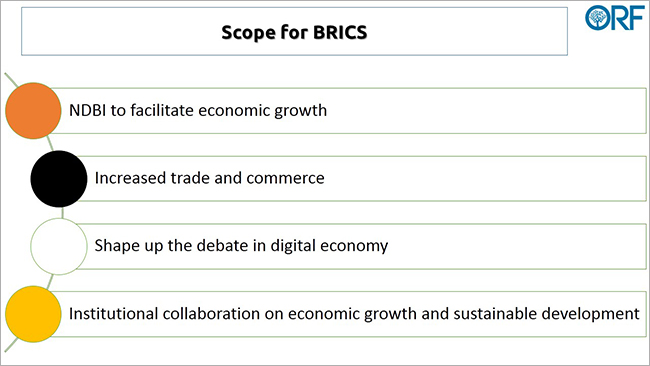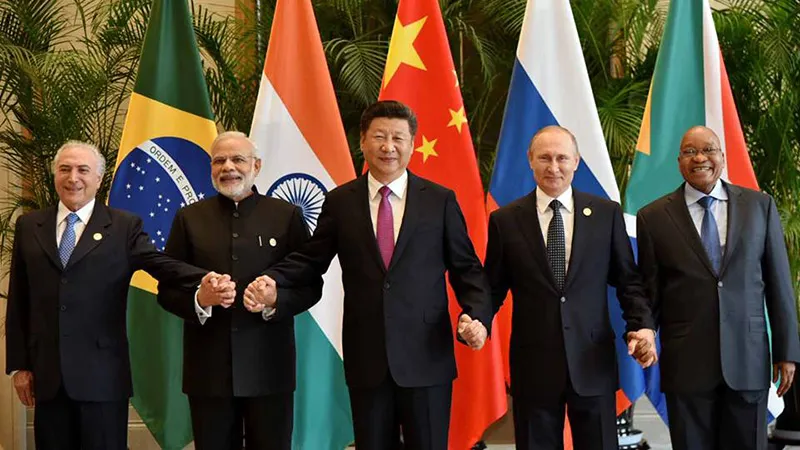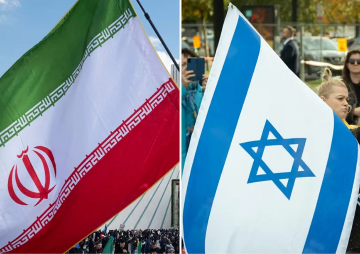When India hosts the 8th BRICS Summit in Goa next month, it will need to be the 'B' along with the 'I" in BRICS. The 'bright spot' that infuses direction, ideas and momentum into a collective whose individual members have certainly seen better days. With a relatively strong economic performance and a vigorous and imaginative foreign policy (on most counts), India has the capacity to help the BRICS plurilateral discover a new ethos that will channel cooperative sentiments into concrete objectives, durable institutions and constructive internationalism.
For the Indian BRICS presidency to achieve this, it would need to get all members to agree on the need for creating new and agile institutions that can help the group and others respond to the current economic and political realities, and the visceral gridlock that plagues multilateralism and global governance generally.
In a recent article penned by the authors, two organising principles had been proposed as being fundamental to the BRICS regimes even as they seek to reform, reshape and steer the contemporary geopolitical and geo-economic environment. The first was the principle of 'sovereign preponderance' and the second the principle of 'democratic equity'. As per the former principle, the state remains the primary and inviolable unit in the international system and its imperatives override all other concerns in setting the international agenda. Intra-state cooperation is possible insofar as such cooperation leads to greater state agency. This higher agency is then channelled to meet the unique developmental needs of each country and, through it, the global community.
The principle of democratic equity holds that the international order, in the economic, political or security spheres, should be shaped equitably after taking due cognisance of the increasing heft and aspirations of emerging powers and economies. These two principles do indeed shape various BRICS regimes that contexualise developmental and economic goals, both within the member-states and in the international system at large. They also motivate the stated ambition of this group to redress unfairness (perceived and real), intrinsic to the extant global political and economic governance architectures. With these organising principles as the basis, it becomes apparent that 'institutions'and 'institutionalisation' are imperative for the collective-action plans of the BRICS.
Read: BRICS, globalisms, and the return of the state
The very act of institutionalisation within BRICS gives the BRICS regimes lives of their own, even while there is contest and conflict on some issues among member states. Institutionalist literature and studies have recognised this aspect. This literature suggests that institutions persist, since the costs of setting up new institutions are often much higher than the benefits that would accrue by dissolving them. Sunk costs (into building institutions) also lock institutions into a path of dependence that leads to increasing (as opposed to decreasing) returns over time.
Institutions codify cooperation and convergence of expectations. They also specify limits to cooperation by delineating formal agreements on some instances and looser norms of cooperative behaviour on others. The former is, by definition, binding while the latter allows wider sovereign leeway.
Taking a leaf from this body of work, the BRICS must seek to further their agenda through the creation of four new institutions and institutional arrangements with varying degrees of formalisation.
The first such formal institution must be the New Development Bank Institute (NDBI), the ideational arm of the NDB and perhaps of the wider BRICS project itself. The notion of the NDBI was proposed by Prime Minister Narendra Modi last year who described it as "a bank of ideas, a storehouse of experience and a knowledge powerhouse." The NDBI must become the institution that defines the pathway for the bank but more expansively becomes the laboratory where BRICS produces new narratives, discovers new ideas and develops new solutions for the political and economic future. It must seek to become an OECD-like think-tank of and for the emerging world, where issues of economy, currency, credit rating, political risk, industrial models and development options are agitated and sought to be responded to.

A second key arrangement must be developed for trade and commerce. It is apparent that the BRICS, more than any other significant group, is invested in the open and democratic trading system led by the WTO, even as the progenitors of the WTO are seeking to subvert the system with mega free trade agreements involving group of similarly placed economies and some others with little choice or agency. One area within this rubric would be the setting up a body that would develop and set BRICS-wide standards and benchmarks. While a BRICS free trade agreement appears far-fetched, a body that sets benchmarks and standards is in everyone's interest. It allows BRICS to engage on an aspect that decisively shapes global trade and would contribute to strengthening the multilateral trading regime, even as it furthers intra-BRICS trade without a formal FTA.
The very act of institutionalisation within BRICS gives the BRICS regimes lives of their own, even while there is contest and conflict on some issues among member states.
A third key BRICS institutional framework that must be created, is for the digital economy where BRICS members are already key stakeholders. Currently, the Atlantic powers are embarking on a major programme to shape the norms that will govern the digital space. The proposed 'Digital 2 Dozen' principles of the Trans-Pacific Partnership, and the digital regulation initiatives of the European Union are examples of this. As leading consumers as well as creators of digital technologies, products and solutions, BRICS needs to be influential voices in the norms-making space. They must act to shape the discursive space around the digital world and inform debates around contentious issues such as encryption, supply chain integrity, data management and data flows and appropriate stakeholder models to manage these aspects.
Read: New norms for a digital society
Finally, BRICS must formalise institutional collaborations that explore the unique opportunities and challenges lying at the intersection of the twin imperatives of economic growth and sustainable development. The BRICS development agenda should be one that promotes the latter without sacrificing the former. This could be tasked to a standing conference on development partnership, an initiative to discover and promote a BRICS development agenda. It would also catalogue experiences of member states and others, diffuse lessons learned to those who seek it, and track progress unobtrusively within a voluntary and democratic framework.
It will follow and measure BRICS' implementation of the ambitious multilateral agreements pertaining to sustainability and climate action, but in a way that does not constrain imperatives of states as they chart their unique developmental trajectories. This new ethos of managing development and assisting others in their own endeavors correspond to both the organising principles of sovereign preponderance and democratic equity.
This commentary originally appeared in FirstPost.
The views expressed above belong to the author(s). ORF research and analyses now available on Telegram! Click here to access our curated content — blogs, longforms and interviews.





 PREV
PREV

